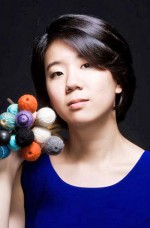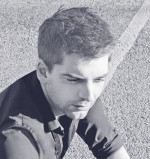Title
In many ways, the Juilliard Orchestra’s April 8 program is about beginnings. Not your typical introduction-exposition-Mozartean happy beginning that makes you immediately excited about the concert that’s unfolding before you, but more a type of reawakening that makes you dig deeper and stretch your musical expectations.
Body
The concert will be conducted by German composer and conductor Matthias Pintscher, who told The Journal that since it’s a student orchestra, “we’re not only there to produce concerts that sit well and are perfect on paper. I feel obligated to bring in something new.” While he made his debut with the orchestra in 2011, this will be the first time he has conducted here since the announcement was made that he will join the composition faculty this fall.
First on the program is the New York premiere of one of Pintscher’s most recent pieces, bereshit (pronounced b’ray-SHEET, although the students might tell you otherwise—and they’ll tell you not to step in it). In fact, bereshit means “beginning” and is the first word of the Book of Genesis. At a performance of the piece last summer in Los Angeles, Pintscher told the audience they had probably never heard anything like it before.
Hearing Pintscher describe the sonic qualities of his piece is poetic, almost magical. “It’s music that comes from nothingness and then suddenly you get a glimpse of something that’s separable from the water and heaven,” he said. “There’s this beautiful moment of individual awakening that’s very sensual and very intricate. [The individual musical lines] are being kissed awake until they all join in and participate in sharing the process of creation.”
In planning the rest of this program, Pintscher recommended that the orchestra give the U.S. premiere of Swiss composer Michael Jarrell’s percussion concerto ... Un long fracas somptueux de rapide céleste ... praising the piece’s color scheme, extended techniques, and beefy accompanying parts. The featured soloist is the legendary June Hahn (B.M. ’08). She’s legendary in the percussion department, anyway: every female percussionist who has entered the studio since Hahn has been nicknamed Other June, Other Other June, Other Other Other June, etc. Hahn was the runner up at Juilliard’s last percussion concerto competition, six years ago, and studied marimba in Paris for two years before returning to Juilliard for a master’s degree, which she’ll complete this spring.
While Hahn has given numerous Korean premieres, this is her first U.S. premiere as well as the first time she’s soloed in front of an orchestra on more instruments than just a marimba. The setup requires about 10 square feet of gear: cymbals, crotales, gongs, triangles, congas, a marimba, and a xylophone, to name a few. Though it takes her about an hour to set everything up, Hahn is embracing this new challenge, and told The Journal that figuring out the setup and choreography around the instruments has been one of the most enjoyable parts of learning the piece.
The work starts with a “primal explosion” that reappears throughout the piece in varying intensities. “It’s all about gestures and dynamics in various timbres,” Hahn said. On Jarrell’s website, he explains that he was influenced by Julien Gracq’s book Un Balcon en forêt, which describes the beginning of the German invasion of France in World War I and goes into detail about the din of the cannons, or Rapides, which were a type of fast-firing canon first used in World War I. Gracg’s “way of describing something so brutal and terrifying with such poetry and such expressive strength is definitely remarkable,” the composer wrote.
The piece premiered in Switzerland in 1998, but was later revised for Florent Jodelet, a friend of Jarrell’s. “I like writing for people I know and personalizing concertos. It’s like driving a Ferrari, suddenly you feel like trying different things out, like, can it really go this fast?” the composer told The Journal. Jarrell also noted that the technical difficulties with the large setup were a result of Jodelet’s talent for finding and building solutions for passages that require a lot of quick movements around large setups.
Bartók’s monumental Concerto for Orchestra (1943) completes the program. Playing it is somewhat of a rite of passage for orchestral instrumentalists at Juilliard, and Pintscher, 43, confirms why. “We wanted to do something that features the individual capacities of the orchestra. It’s a concerto for the players and it’s a project that serves the needs of us young musicians coming together.”
So concertgoers who need more new music than the New Juilliard Ensemble and Axiom provide are in for a treat this month. And Pintscher has some advice for those who are wary about the first half of a concert filled with new music: “It’s like trying new food. You have to try it, and you might just fall in love with it.”






